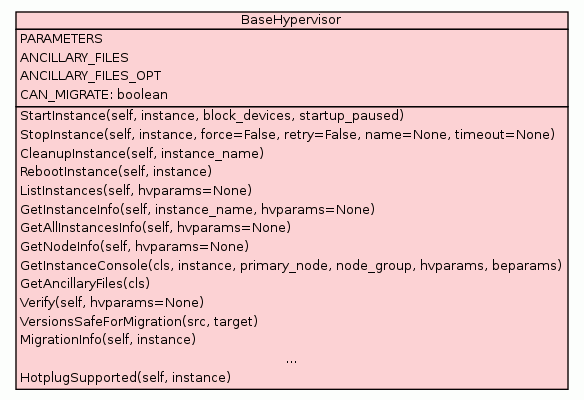
| Trees | Indices | Help |
|
|---|
|
|

Abstract virtualisation technology interface
The goal is that all aspects of the virtualisation technology are abstracted away from the rest of code.
|
|||
|
|||
|
|||
|
|||
|
|||
|
|||
| (string, string, int, int, HvInstanceState, int) |
|
||
| (string, string, int, int, HvInstanceState, int) |
|
||
|
|||
|
|||
| string/data (opaque) |
|
||
|
|||
|
|||
|
|||
|
|||
|
|||
| objects.MigrationStatus |
|
||
| integer |
|
||
|
|||
|
|||
|
|||
|
|||
|
|||
|
Inherited from |
|||
|
|||
|
|||
| (list of absolute paths, list of absolute paths) |
|
||
| bool |
|
||
|
|||
|
|||
|
|||
|
|||
|
|||
|
|||
|
|||
|
|||
|
|||
PARAMETERS = {}a dict of parameter name: check type; the check type is a five-tuple containing: |
|||
ANCILLARY_FILES = []
|
|||
ANCILLARY_FILES_OPT = []
|
|||
| boolean |
CAN_MIGRATE = Falsewhether this hypervisor can do migration (either live or non-live) |
||
|
|||
|
Inherited from |
|||
|
|||
Stop an instance
|
Cleanup after a stopped instance This is an optional method, used by hypervisors that need to cleanup after an instance has been stopped.
|
Get instance properties.
|
Get properties of all instances.
|
Return information about the node.
|
Return a list of ancillary files to be copied to all nodes as ancillary configuration files.
|
Verify the hypervisor.
|
Decide if migration between those version is likely to suceed. Given two versions of a hypervisor, give a guess whether live migration from the one version to the other version is likely to succeed. The current |
Get instance information to perform a migration. By default assume no information is needed.
|
Prepare to accept an instance. By default assume no preparation is needed.
|
Balloon an instance memory to a certain value.
|
Finalize the instance migration on the target node. Should finalize or revert any preparation done to accept the instance. Since by default we do no preparation, we also don't have anything to do
|
Migrate an instance.
|
Finalize the instance migration on the source node.
|
Get the migration status
|
Get the correct startup memory for an instance This function calculates how much memory an instance should be started with, making sure it's a value between the minimum and the maximum memory, but also trying to use no more than the current free memory on the node.
|
Check if the parameter value is a kind of value meaning unspecified. This function checks if the parameter value is a kind of value meaning unspecified.
|
Check the given parameters for validity. This should check the passed set of parameters for validity. Classes should extend, not replace, this function.
|
Check the given parameters for validity. This should check the passed set of parameters for validity. Classes should extend, not replace, this function.
|
Hard powercycle a node using hypervisor specific methods. This method should hard powercycle the node, using whatever methods the hypervisor provides. Note that this means that all instances running on the node must be stopped too.
|
For linux systems, return actual OS information. This is an abstraction for all non-hypervisor-based classes, where the node actually sees all the memory and CPUs via the /proc interface and standard commands. The other case if for example xen, where you only see the hardware resources via xen-specific tools.
|
Formats the verification results, given a list of errors.
|
Verifies that hotplug is supported. Given the target device and hotplug action checks if hotplug is actually supported.
|
Checks if hotplug is supported. By default is not. Currently only KVM hypervisor supports it. |
|
|||
PARAMETERSa dict of parameter name: check type; the check type is a five-tuple containing:
|
| Trees | Indices | Help |
|
|---|
| Generated by Epydoc 3.0.1 on Mon Aug 22 11:13:21 2016 | http://epydoc.sourceforge.net |